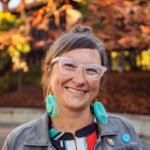His Face
Celeste Hamilton Dennis
Dad and his girlfriend Diana shared many things as their relationship became more serious: a house in Levittown, her two teenage boys, Dad’s bank accounts. And they shared a landline. I was standing in a parking lot at a Circle K in Phoenix, the sun as searing as the burning seat belt I’d released from my skin. Dad didn’t pick up the phone, so I left a voicemail. “It’s Celeste. Happy Father’s Day! Call me back when you get a minute.”
The next day, he called and asked why I didn’t contact him on “his” day. I explained. He didn’t believe me. A few days later, I emailed him a scanned picture of my cell phone bill, his number listed in the call log.
“This doesn’t prove anything,” he said when I called him. “I don’t know why you’re lying, Celeste.”
“Dad, I’m not—” My words were punctuated. He should’ve known they stretch like taffy when I lie.
“Diana says there wasn’t a message,“ he said. “And I didn’t hear it either.”
Maybe Diana erased the message. Maybe there was a technical issue with the machine. But I’d faced months of this woman keeping him from me and my sister, and years of frustration at Dad’s sudden mood swings.
“I never want to talk to you again!” I screamed and hung up.
And I never did. He died a few months later from a stroke.
Dad was charming. He had round cheeks and freckles everywhere, even on the back of his knees, and a generous laugh that made his eyes disappear. He loved doing Ralph Kramden impressions. He was a hardcore Yankees fan, happiest when he was trolling somebody about the Mets. He and my mother divorced when I was 12, and he rented the top floor of an older woman’s house that permanently smelled of burnt pancakes, so he could live near me and my sister.
But with one sentence he could turn, and we all felt his wrath. Once, he shoved my mother while she was holding my baby sister. When my sister got older, piercing every part of her face and falling in with boys who raced cars around dirt tracks, he hit her with a phone. My senior year of high school, he gave me a black eye.
A decade after he died, I took a DNA test. In the findings about health risks: bipolar disorder. I stared at the words listed so plainly. For years, my mother had told us. “He’s a whack job,” she’d say. “Bipolar.” I was dismissive of her diagnosis, leaning instead on my own narrative: He’d stuck up for his mother when his father abused her, but then couldn’t break the cycle of abuse.
I can’t say that I would have behaved differently if I had known about the diagnosis. I don’t know if he would have acknowledged he had bipolar, or sought treatment. But to have this word would have been a starting point for me.
I called Dad’s oldest sister in North Carolina one day while at the playground. My 7-year-old daughter, Marvi, was preoccupied on the monkey bars, her compact body in a cheetah print coat swinging through the air, silver sparkly dress shoes reflecting the sunshine. She’d already skipped two bars, and was determined to keep challenging herself.
I asked my aunt about bipolar in the family. “Oh, honey. Don’t you know all of us have a touch of it?”
All of us.
Marvi was now hanging upside down from the monkey bars. I was silent. At times, I recognized Dad’s anger in my own. And Marvi, whose middle name was Dad’s, could match mine.
“Mom!” she said. “Come here and tickle me!”
She unhooked one leg. I had told her not to hang like that and sometimes, it infuriated her. If I told her “no,” she could have a fit.
I moved the phone away from my ear. “I’m busy, honey!”
She gritted her teeth and growled at me, upside down. I waited for the explosive words. But they didn’t come. She maneuvered her body right side up, gracefully dropped to the ground, and giggled. Eyes disappearing. Her round cheeks covered in freckles.
His face.
 Celeste Hamilton Dennis is a creative writer and solutions journalist in Berkeley, California. Her writing has appeared in various literary journals including Lunch Ticket, Gravel, Buckman Journal, Boston Accent Lit, Stoneboat Literary Journal, Queens Mob Teahouse, Literary Orphans, and more. Currently, she’s working on a book of short stories connected by her hometown of Levittown, New York.
Celeste Hamilton Dennis is a creative writer and solutions journalist in Berkeley, California. Her writing has appeared in various literary journals including Lunch Ticket, Gravel, Buckman Journal, Boston Accent Lit, Stoneboat Literary Journal, Queens Mob Teahouse, Literary Orphans, and more. Currently, she’s working on a book of short stories connected by her hometown of Levittown, New York.
Back to Table of Contents for Parents | Prose Edition
